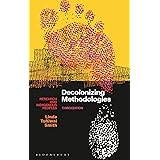
Download the free Kindle app and start reading Kindle books instantly on your smartphone, tablet, or computer - no Kindle device required.
Read instantly on your browser with Kindle for Web.
Using your mobile phone camera - scan the code below and download the Kindle app.

OK
Red Pedagogy: Native American Social and Political Thought
There is a newer edition of this item:
$41.58
(59)
Only 1 left in stock - order soon.
- ISBN-100742518299
- ISBN-13978-0742518292
- PublisherRowman & Littlefield Publishers
- Publication dateSeptember 1, 2004
- LanguageEnglish
- Dimensions5.75 x 0.75 x 8.75 inches
- Print length184 pages
Customers who viewed this item also viewed
Editorial Reviews
Review
Sandy Grande ably succeeds in defining the common ground between American Indian intellectuals and critical scholars engaged in anti-imperialist and anticapitalist struggles for decolonization, an unintended but plausible and relatively absent anticolonial indigenous contribution to critical adult education. (Adult Education Quarterly)
Although critical of dominant modes, Grande nevertheless maintains that scholars should not reject all of them, but instead maintain a critical stance, a key component of Red Pedagoogy. This book is necessary reading for anyone seeking 'emancipatory pedagogies' for indigenous people. (Steven Crum)
Red Pedagogy is sure to become a classic text in the field of critical education. Grande's book represents arguably the most significant advancement within the critical pedagogical literature in recent decades. It is a book that cannot be ignored. This book will define the central terms of the educational debate over social justice for years to come. It is a landmark work by one of education's most important new scholars and activists. (McLaren, Peter)
About the Author
Product details
- Publisher : Rowman & Littlefield Publishers (September 1, 2004)
- Language : English
- Paperback : 184 pages
- ISBN-10 : 0742518299
- ISBN-13 : 978-0742518292
- Item Weight : 11.2 ounces
- Dimensions : 5.75 x 0.75 x 8.75 inches
- Best Sellers Rank: #359,204 in Books (See Top 100 in Books)
- #434 in Native American Demographic Studies
- #1,312 in History & Theory of Politics
- #1,705 in Core
- Customer Reviews:
About the author

Discover more of the author’s books, see similar authors, read author blogs and more
Customer reviews
Customer Reviews, including Product Star Ratings help customers to learn more about the product and decide whether it is the right product for them.
To calculate the overall star rating and percentage breakdown by star, we don’t use a simple average. Instead, our system considers things like how recent a review is and if the reviewer bought the item on Amazon. It also analyzed reviews to verify trustworthiness.
Learn more how customers reviews work on Amazon-
Top reviews
Top reviews from the United States
There was a problem filtering reviews right now. Please try again later.
Grande walks you through some history in indigenous education as she builds a new theory around how indigenous education scholars should imagine interpretative frames in the present and future. This books sends thoughts of a vision for vastly improving indigenous education.
Grande’s assessment of Marxism and feminism explain how both seemingly liberal movements become anti-Indigenous within a Euro-American framework. She points out “the humanistic tradition that presumes the superiority of human beings over the rest of nature,” and how “both Marxists and capitalists view land and natural resources as commodities to be exploited.” We all must use the natural world to survive; the difference is in the presumption of superiority.
She also reflects on “the failure of ‘mainstream’ feminists to recognize that most American Indian women view their lives as shaped, first and foremost by the historical-material conditions of colonization and not some universal patriarchy. … By insisting on gender as the primary conceptual framework from which to interpret inequality, such theorists not only blur the actual structures of power but also obfuscate feminism’s implication in the projects of colonization and global capitalism.”
Some critical race theorists, such as Robert A. Williams suggest that the progression of democratic thought, replacing the church with the state as the central political structure, is a myth. Williams says that “the universalized hierarchical structures of medieval thought continue to define Western legal and political theory and therefore the democratic praxis.” Likewise the “Calvinist” work ethic has been replaced by an industrialist work ethic. Hard work, progress, and productivity confused with consumption. The problem of a consumer-based culture.
Grande’s work is important in that it points out the blind spots even well-meaning educators, arts organizers, activists, and socially conscious individuals may have with it comes to Native American belief systems and ways of being.









